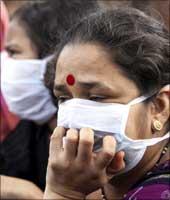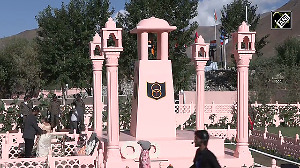 "There is no panic about the swine flu in Gujarat. We have assured quick diagnosis and quicker treatment up to the district level. We are taking the pandemic very seriously. So far, of all the patients examined in Gujarat, some 20 per cent have been diagnosed with swine flu. But we have geared up well. We will go through the crisis with minimum damage. We consider this problem as a challenge," says Jai Narayan Vyas, the state health minister, who is supervising the medical preparedness to tackle the increasing number of H1N1 cases.
"There is no panic about the swine flu in Gujarat. We have assured quick diagnosis and quicker treatment up to the district level. We are taking the pandemic very seriously. So far, of all the patients examined in Gujarat, some 20 per cent have been diagnosed with swine flu. But we have geared up well. We will go through the crisis with minimum damage. We consider this problem as a challenge," says Jai Narayan Vyas, the state health minister, who is supervising the medical preparedness to tackle the increasing number of H1N1 cases.
He informed rediff.com that in Gujarat, out of the 64 patients examined, 14 have been found with the H1N1 virus. Of the 14, only one patient, a non-resident Indian, died on Saturday. Eight patients had a 'foreign' connection. A group of youngsters had traveled abroad as part of an 'international living' programme. Some of them have contracted the swine flu.
"One has to forget about the NRI connection in spreading of the swine flu. That stage has passed when the primary source of infection was from abroad. Now, the disease is spreading through locals and amongst locals within India," he pointed out.
He says that the Gujarat government started its preparations as soon as WHO declared swine flu as a serious pandemic. In the last few weeks, Gujarat has set up a special laboratory to test swine flu, as per the 'bio-safety standard -3 laboratory'. India has only 19 such laboratories.
A few weeks ago, samples from flu patients had to be sent outside Gujarat and it usually took 36 to 40 hours to know the results.
Now, the new laboratory in B J Medical College in Ahmedabad takes less than six hours to find out the result of the test.
According to official details available with the Gujarat government, Atlanta-based Pravin Patel, who died from swine flu, had developed symptoms of the disease on July 31. He received treatment in private dispensaries initially. When he was finally brought to the civil hospital run by the government, he was on ventilator and his blood count had dropped. He had weak lungs and showed signs of suffering from pneumonia.
Vyas says, "We are telling people that if you have headache, problems in breathing, inflammation of tonsil, fever, drowsiness or if you are suffering from lack of hunger, then you should contact a physician. We are explaining that people having some of these symptoms may not have swine flu. There is no cause for panic if you have viral fever. Along with swine flu, even cases of viral fever have been registered in Gujarat. It is not possible to test all the persons having viral fever. We can do so only when the physician refers the patient to the Health Department".
He said that children, old people, smokers, pregnant women and diabetic patients are more vulnerable to diseases, and they should be given more attention.
Gujarat has got enough stock of Tamiflu and Relenza, the two known medicines to tackle swine flu, assured Vyas.
Once a patient was diagnosed with swine flu, the medical course was given to his close relatives as well, as a preventive measure. Special wards have been created to isolate H1N1 patients in all the government hospitals.
Vyas regretted that there was no vaccine available to cure swine flu in its advanced stages. Though pharmaceutical company Novartis has already started human trials for its swine flu vaccine, and three other pharmaceutical companies are carrying out research, it would take a few more months before such a vaccine is available to the public.






